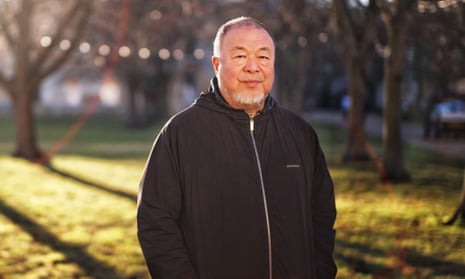Art that can be easily replicated by artificial intelligence is “meaningless”, according to the Chinese dissident artist Ai Weiwei, who believes even Pablo Picasso and Henri Matisse would have had to rethink their approach if AI had existed in their era.
Ai Weiwei’s comments feed into the current charged debate about the rise of AIs that use data scraped from artists’ websites to create “original” images in their style.
There have been several class-action lawsuits in the US, and artists whose aesthetic is popular among users of AIs have already reported thousands of images that use their work as a base, often without permission.
When asked about the issue, Ai Weiwei said: “That’s not a problem. I think that kind of art should [have died] a long time ago,” before he criticised art teaching that focuses on creating “realistic” images. “It takes AI a second to do it. So that only means what they have learned very often is meaningless.”
Asked if that applied to great masters who had a defined style, such as cubism, Ai Weiwei said: “I’m sure if Picasso or Matisse were still alive they will quit their job. It’d be just impossible for them to still think [the same way].”
Ai Weiwei’s next work is a collaboration between himself and an AI – where the two will give answers to the same list of 81 questions posed over 81 days, the number alluding to the same amount of days he was confined by the Chinese state in 2011.
Titled Ai vs AI, the questions – which include: “Love or hate, which lasts longer?”, “Will capitalism have an end?” and: “Is Edward Snowden guilty?” – will be projected on to Piccadilly Circus’s big screen and others around the world from the evening of Thursday 11 January. The answers will then be posted online.
The artist, who now splits his time between Cambridge and Portugal, described the work as “a bit of fun” and similar to someone throwing a pebble across a pond to see the ripple effect. But he did signal a warning about the future if artificial intelligence becomes too powerful and relied upon by countries around the world.
He is fearful AI could create a society similar to the Third Reich, where there is only one “right” answer to the big questions. “For me it is very much like what happened in the 1930s in Germany, or 1960s in China with the Cultural Revolution,” he said. “You all have one ideology, one past, and the one so-called ‘correctness’. This is dangerous.”
Born in Beijing in 1957, throughout his career he has been an outspoken critic of the Chinese authorities after growing up in labour camps in north-west China following the exile of his father, the poet Ai Qing.
The Chinese dissident artist was himself recently embroiled in a row over free speech and the Israel-Gaza conflict. In November an exhibition of new works was pulled by Lisson gallery and indefinitely put on hold after a tweet that began: “The sense of guilt around the persecution of the Jewish people has been, at times, transferred to offset the Arab world.”
The tweet was deleted, with Ai telling journalists his show had “effectively [been] cancelled” but noting that the decision had been taken “to avoid further disputes and for my own wellbeing”.
The sculptor and activist said he did not regret speaking out, believing it is the role of artists to ask difficult questions. “If you think you’ve got freedom of speech, what that means is whatever you’ve said is not relevant; it means it’s acceptable. So something like what I said, I didn’t even think it could cause a disturbance but the consequence is clear. That proved what I said does have some meaning.”
Asked if that was a fundamental role for all artists, he added: “It is. There’s no choice. That’s your profession. You’re supposed to be demanding the so-called ‘inner truths’. You have to take the opportunity to say it before you don’t have the chance to say it. There are so many people who are voiceless with no way to be heard.”
“My mission is about asking questions and not massage the powerful, not to make them feel comfortable,” he added. “I’m undertaking a dangerous mission and so far I’m still alive.”
Ai vs AI is part of CIRCA 20:24 and launches on 11 January
